VE Day had atmosphere of relief, says WW2 veteran
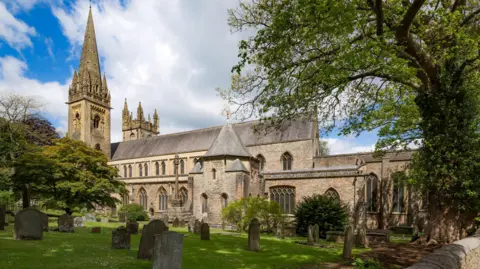 Getty Images
Getty ImagesWales' First Minister Eluned Morgan led a service to mark 80 years since the end of World War Two in Europe.
The VE Day 80 service, took place at Cardiff's Llandaff Cathedral on Wednesday evening, brought together about 250 people, including veterans and politicians, paying tribute to those who helped secure peace in Europe.
It was held a day before a national service of remembrance and thanksgiving for VE Day, taking place at Westminster Abbey in London.
"It's an honour to be going to Llandaff Cathedral to remember the exceptional courage and resilience of those who fought for our freedom," Morgan said.
A war veteran said he remembered an atmosphere of "relief" during VE Day in 1945.
More than 15,000 Welsh soldiers died during World War Two, and the event included a minute's silence to remember them.
"This anniversary is about honouring ordinary Welsh people who did extraordinary things. This isn't just another date in our history books, this was a moment that changed lives, changed Wales and our world," Morgan said.
The first minister met with some of those who took part in the war, saying it was important "we give thanks and think about those who lost their lives to give us our freedom".
Morgan added that the 80th anniversary of VE Day was significant because "realistically this is probably the last major time that we will have those veterans with us".
She said that many people were affected by the war, and that her father's house was bombed, highlighting the importance of teaching "the next generation not to take peace for granted".
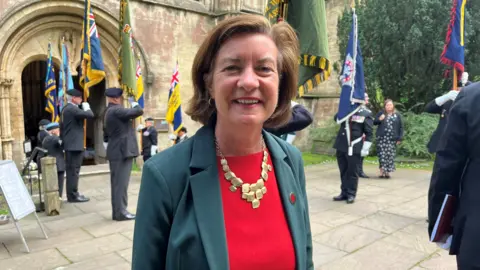
One of those to attend the ceremony was John Howell Rees, 97, who was 18 when he was called up to the war as a Bevin Boy - young men conscripted to work down the mines in dangerous conditions - admitting he was "petrified".
"So many people don't know what happened. There are just three Bevin Boys left in Wales and I'm the only one here today," he said.
He said he was living in Clydach, Swansea, when VE Day took place, remembering people celebrating in the street.
"We were all so happy and relieved. There were trestle tables all down the street - all I remember from the atmosphere was relief."
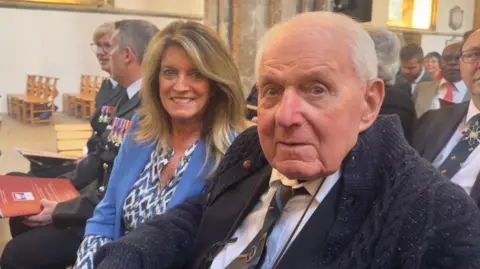
His daughter, Susan Chatfield, said she was pleased her father could attend the ceremony.
"I remember him telling me stories of VE Day growing up and we are so proud of him."
Basil Smith, from Carmarthenshire, served in the war as part of the Desert Rats, which operated in North Africa, and said that on VE Day he was relieved to be home in "normal surroundings" and not in the desert.
He said he did not have a party on VE Day, but instead had a "nice and quiet" evening and played some tennis.
Mr Smith described himself as "very lucky" to have survived the war.
"Millions never made it back, thousands are buried in unknown and unmarked graves, which must be terrible for those families," he said.
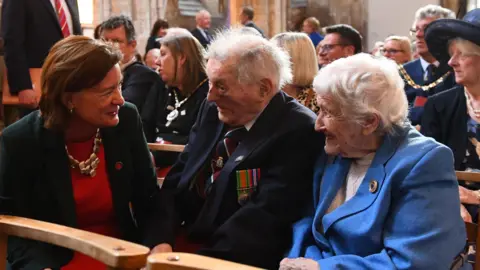 Welsh Government
Welsh GovernmentAt 15:00 GMT on 8 May 1945, Prime Minister Winston Churchill announced on the radio that the war in Europe had come to an end, following Nazi Germany's surrender the day before, sparking spontaneous celebrations across the country.
"We may allow ourselves a brief period of rejoicing, but let us not forget for a moment the toil and efforts that lie ahead," Churchill said in his announcement.
VE Day was also a moment of great sadness and reflection, as millions of people had lost their lives or loved ones in the conflict, which began in 1939.
But even after 8 May, many had to continue fighting battles in other parts of the world away from Europe where the war continued, while others were still being held as prisoners of war.
The war officially ended on 15 August 1945 - known as Victory over Japan Day or VJ Day - shortly after atomic bombs were dropped on the Japanese cities of Hiroshima and Nagasaki.
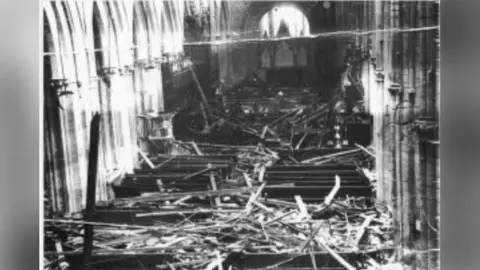 Llandaff Cathedral
Llandaff CathedralLlandaff Cathedral was directly impacted by the war, one of the most important global moments of the 20th century.
Some people found solace in attending church at a time of sadness, and the cathedral opened its doors to the local community.
Major towns and cities were subjected to nightly bombing campaigns at the hands of the German Luftwaffe during the winter of 1940 and 1941.
On 2 January 1941, Cardiff was targeted, with 165 people killed and more than 400 seriously injured.
Parachute landmines fell on Llandaff, with one becoming entangled in one of the cathedral's spires, before falling into the churchyard and exploding.
The cathedral's roof collapsed inwards, leading to much of the inside and its contents being destroyed.
Even when the war was over, restoration could not begin immediately as materials and labour were being reserved for other buildings that needed repair.
